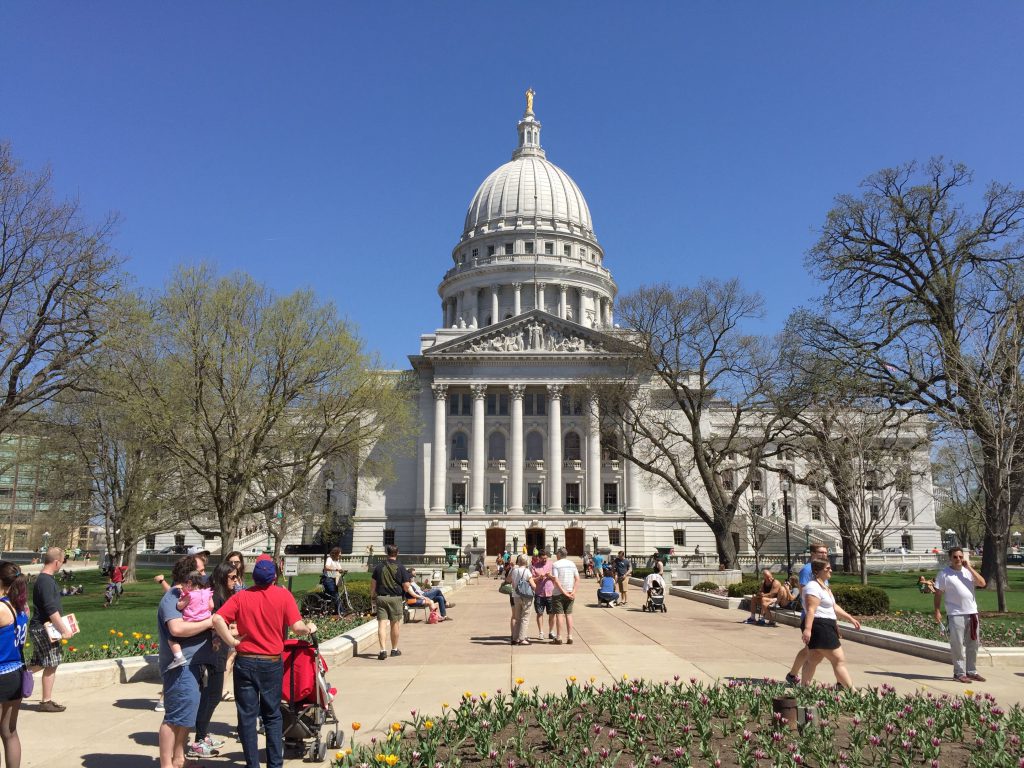Healthy Economy Buys New State Spending
Which helps explain budget victory being claimed by both parties.
When Wisconsin’s economy is booming, unemployment is at a record low, and state income taxes paid by corporations are up 57 percent, according to the most recent Wisconsin Department of Revenue report, governors and legislators can all smile and agree on a new state budget.
The opposite was true exactly 10 years ago.
Then, the Great Recession caused general-fund tax collections to drop by almost $900 billion, or about seven percent with corporate tax collections down by 24 percent. Democratic Gov. Jim Doyle and Democrats who controlled the Legislature made painful decisions — raise revenues and use one-time federal stimulus cash to pay monthly bills — that forced them out of office in November 2010 elections.
This year, if a state budget had a musical soundtrack, it would be “Happy Days Are Here Again.” Elected officials fought over whether to boost state spending by 8 percent or 5 percent. Everyone — Democrats and Republicans — claimed victory, and credit.
“This budget delivers on many of the important promises I made to the people of Wisconsin and makes progress toward fixing our roads, supporting schools, increasing funding for health dare and cutting taxes for working families,” Democratic Gov. Tony Evers said before signing the 2019-21 spending package.
The governor’s line-item changes spent $65 million more on state aid for K-12 schools, and killed GOP plans to require FoodShare recipients to work, get job training and drug testing to keep getting benefits. He also nixed $2.5 million to study whether to pay for highways with tolls or a mileage-based fee.
Assembly Speaker Robin Vos said wiping out work and drug-testing requirements for those using FoodShare benefits will “allow people to cheat the system.”
“Gov. Evers seems intent on trapping people on welfare,” Vos added. “Because of his partial vetoes, he’s starving programs that incentivize work, undermining their implementation and skirting the law. We know people support drug testing and work requirements for welfare recipients.”
Evers, by contrast, called these “burdensome requirements” on low-income people with “unrealistic” timelines to implement the programs.
Despite the disagreement, Vos said, “Wisconsin has a good budget” overall.
Senate Majority Leader Scott Fitzgerald said his party made sure the budget “spent $2 billion less than the governor’s original plan” – the difference between a 5 percent and an 8 percent jump in total spending.
Fitzgerald added: “Schools throughout the state will have certainty as to what resources are available to them as they begin putting their budgets together for the upcoming school year – including an increase in special education funding.”
Republicans added $100 million for special education programs – the first increase in 10 years, but much less than the $600-million increase requested by Evers, a former state superintendent of public instruction.
“All told, we’re spending more actual dollars on K-12 education than ever before in state history,” Fitzgerald said.
The Evers veto that boosted state spending on schools $65 million beyond what the Legislature approved means K-12 aids will go up by about $570 million by mid-2021.
Republicans rejected Evers plea to expand Medicaid to more than 80,000 low-and middle-income residents, which would have been largely paid for with federal cash and would have saved state taxpayers $324 million over two years, the non-partisan Legislative Fiscal Bureau (LFB) computed.
But, Fitzgerald noted, “The governor signed our increased funding in the Department of Health Services including more money for caregivers, mental health treatment, long-term care, rural health care, dental services, lead testing, and dementia care specialists.”
Why was there so much cash available?
First, the federal tax-reform act of 2017 gave a one-time windfall to Wisconsin corporations, who will pay an additional $600 million in state taxes over a three-year period, according to a LFB report.
But the state Revenue Department says other tax collections are healthy: Individual income taxes paid were up 6 percent between July 2018 and June 2019; sales taxes, up 4.3 percent.
Unlike 2009, that made it a lot easier for Evers, Fitzgerald and Vos – despite all their differences – to agree on a budget.
So cue the soundtrack. “Happy days are here again/the skies above are clear again…”
Steven Walters is a senior producer for the nonprofit public affairs channel WisconsinEye. Contact him at stevenscotwalters@gmail.com
The State of Politics
-
A Wisconsin Political Trivia Quiz
 Dec 15th, 2025 by Steven Walters
Dec 15th, 2025 by Steven Walters
-
The Fight Over Wisconsin’s House Districts
 Dec 8th, 2025 by Steven Walters
Dec 8th, 2025 by Steven Walters
-
The Battle Over On-Line Betting
 Nov 24th, 2025 by Steven Walters
Nov 24th, 2025 by Steven Walters






















